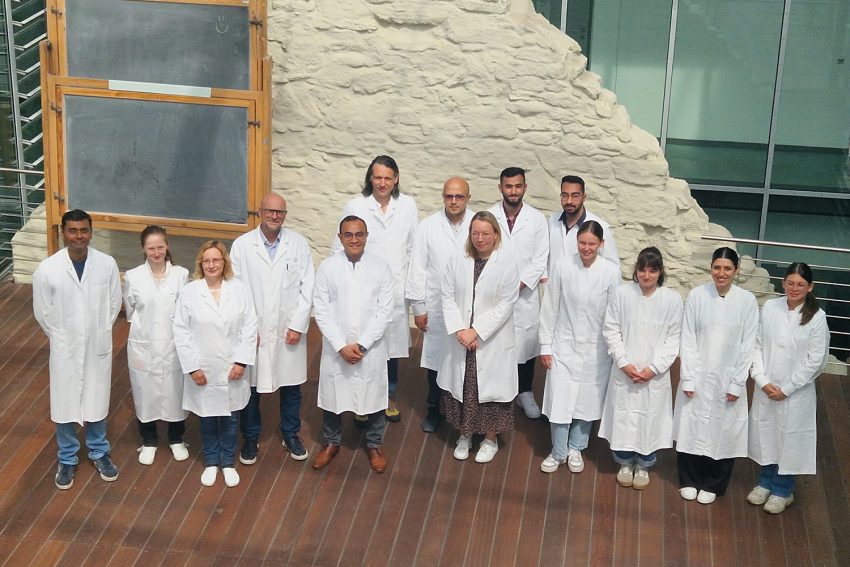Crisis and climate: New expertise for drinking water safety International research module at TU Berlin with RKI, DSMZ, Klinikum and the Centre for Climate Research Niedersachsen
Climate change has a significant impact on the quality of drinking water, so interdisciplinary efforts are urgently needed to mitigate the risk of waterborne infections. This requires expertise in areas such as pathogen monitoring, diagnosis, public health, and infrastructure management. Against this backdrop, the “Engineering for Health” research cluster at TU Braunschweig is hosting a joint research module in English with the University of Nablus. Medical students from the West Bank and biology students from TU Braunschweig are participating in the module.

Group photo: Palestinian medical students and biology students from the TU Braunschweig in the international research module on “Climate Change and Water Infections”, here at the RKI in Wernigerode. Photo credit: Mohamed-Abdelbary
The international research module “Impact of Climate Change on Waterborne Infections and Drinking Water Safety” is a joint project between Technical University of Braunschweig and An-Najah National University Nablus (West Bank). The An-Najah National University Hospital is part of the Faculty of Medicine and Health Sciences and is the only teaching hospital in the West Bank. This non-profit institution is the most important hub for medical services in the Palestinian territories and has rapidly developed into a scientific centre for healthcare since its foundation in 2013.
Forward-looking partnership
Professor Michael Steinert from TU Braunschweig (Institute of Microbiology) developed the training module in collaboration with Dr Ashraf Zayed from An-Najah National University.
As part of the TU Braunschweig’s internationalisation strategy, the ProDiGI project (Promoting Digital Education through Global Interconnection) is supported by the Project House at TU Braunschweig. It is funded as an Erasmus+ KA171 Partner Country Programme by the German Academic Exchange Service (DAAD), with support from International House at TU Braunschweig.
Impact of climate change on drinking water
In 2010, the United Nations General Assembly recognised the right to clean drinking water and sanitation as a human right in Resolution 64/292. Nevertheless, around two billion people worldwide still do not have regular access to clean water or sanitation. Climate change is exacerbating this situation and may further fuel existing conflicts over limited water resources.
Global warming increases the health risks to humans from waterborne infections. Rising water temperatures promote the proliferation of pathogens and lead to temperature adaptations in microorganisms that were previously non-pathogenic, i.e. not disease-causing. Heavy rainfall events can damage or overwhelm water infrastructure. This increases the risk of certain pathogens entering the environment or water bodies, thereby posing a health risk.
Prolonged drought and a lack of precipitation increase the concentration of pathogens in water and disrupt the natural water cycle, which impairs the microbiological quality of water. Sea level rise is also expected to lead to an increased influx of marine pathogens.
Expertise required for drinking water safety
“The dynamic ecosystem approach of TU Braunschweig is being put into practice through close cooperation with our partners at the German Collection of Microorganisms and Cell Cultures (DSMZ), the Robert Koch Institute (RKI), Braunschweig Municipal Hospital (SKBS) and the Centre for Climate Research Lower Saxony (ZKfN),” says Prof Steinert.
“Through joint lectures, bioinformatics tutorials and practical laboratory applications, students are trained to become experts in the field of the impact of climate change on waterborne infections and drinking water safety.”
Dr Ashraf Zayed from An-Najah National University, who completed his doctorate at TU Braunschweig in 2018, comments on the training programme:
“Without the exceptional support and team spirit at TU Braunschweig, our climate change module would not be what it is today. ERASMUS helps us to establish contacts worldwide, but it is the university’s commitment that enables truly effective education and future-oriented solutions.”
Professor Steinert, who visited the West Bank in 2023, explains: “Global climate change is expected to lead to an increase in outbreaks of infections caused by waterborne pathogens. The drinking water system in the West Bank is not prepared for this challenge. There is also a need for action in Germany, as non-cholera vibrio, Legionella, cyanobacteria and waterborne viral infections are on the rise. Furthermore, a European surveillance study has shown that countries with higher average temperatures consume more antibiotics, which can also exacerbate the antibiotic resistance crisis.”
Since the start of the war in the Gaza Strip, the situation regarding medical care and training opportunities in the West Bank has also suffered due to widespread violence. By training medical and biology students from Nablus and Braunschweig, expertise in drinking water safety is now being developed at both universities. International networking and the promotion of young scientists in the spirit of “Engineering for Health” will enable both partners to achieve positive capacity development. In this way, the ongoing project can also serve as a model for partnership-based cooperation with research institutions in other crisis regions in the long term.
